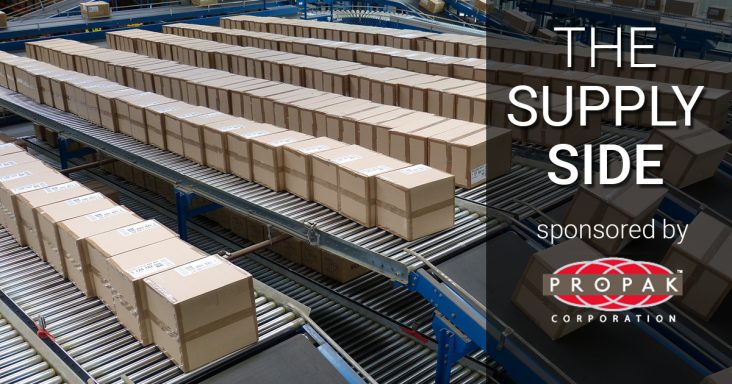The Supply Side: Partnerships to become more common in retail
by December 4, 2021 8:40 am 1,155 views

According to retail analysts and consultants, the retail landscape is ripe for more partnerships among competitors, suppliers and service providers. Walmart is at the center of that trend.
From expanding its GoLocal delivery service to help The Home Depot with final mile deliveries to partnering with Netflix for an online marketplace to sell licensed merchandise ahead of the holidays, Walmart continues to look for partnership opportunities. The retail giant inked an exclusive deal with the Elton John Foundation to sell the music icon’s eyewear. The company also partnered to offer Justice brand fashion for girls and pets in stores and online after the teen retailer shuttered its stores in 2020. Also, in October, Walmart inked a deal with RevolutionParts, a digital OEM (original equipment manufacturer) parts retail enterprise, to have that catalog of products available on Walmart Marketplace.
Scott Benedict, director of retail studies at Texas A&M University, said Walmart is now more likely to partner than ever before. He said the company’s DNA is changing under CEO Doug McMillon and his management team. They seem to recognize that the value in partnerships can outweigh the benefits of the old “do it ourselves” mindset.
While Benedict was somewhat surprised to see the Walmart partnership with The Home Depot, he said both must feel there is plenty to gain. He said partnerships around expanding Walmart’s online retail business are all about growing the marketplace in which smaller retailers sell their products – another revenue stream for the Bentonville-based retailer. And if Walmart can get that right, it would open up an additional revenue stream.
Paul Crotty, the managing partner at Rogers-based Woodridge Retail Group, said final-mile deliveries remain a considerable challenge for even the biggest retailers. He said The Home Depot has opted to let Walmart figure that out while it focuses on something else. He said Walmart has already spent a lot of time and money in that area and has the wherewithal to figure it out. Crotty expects to see other retailers follow that lead, given the expense of doing it themselves.
Supply chain analyst Brittain Ladd said he expects to see more mergers, acquisitions and strategic partnerships between retailers and third-party logistics providers. He applauded The Home Depot for collaborating with Walmart, saying the retailers are thinking bigger regarding supply chains. He said GoLocal delivery is a trust-building exercise for the two retail giants that are among the most prominent global importers of goods.
Ladd said retailers that can own their supply chain would have a considerable advantage. He said Kohl’s expanding its relationship with Amazon to marry their supply chains perhaps would give the department store a huge advantage. The retailers established a partnership in 2019 to allow consumers to make Amazon returns at their local Kohl’s stores. There were plenty of skeptics when the deal was announced, but the department store said the partnership helped draw 2 million new shoppers into its stores last year. It also gave Amazon an instant brick-and-mortar presence for reverse logistics. Benedict said by all accounts that the Kohl’s-Amazon returns partnership was a win-win, and the companies might eventually expand their relationship.
Jason Long, CEO of Eye on Retail in St. Louis, said Kohl’s is proving to be a winner with its “think outside the box” strategies. He said the new partnership with Sephora was also an intelligent move by Kohl’s.
“Sephora is a strong brand with a very loyal following, and having the salons inside Kohl’s will also add foot traffic and provide a halo-effect for Kohl’s,” he said.
Carol Spieckerman, CEO of Spieckerman Retail, said retailer-to-retailer partnerships in their many forms have been on the rise for several years, and they are now experiencing a surge.
“The incentive and inspiration for each deal are unique, yet they all roll up to the fact that diversification is retail’s main growth engine,” Spieckerman said. “Sephora’s hookup with Kohl’s allows Sephora to diversify its physical footprint and scale its brand without building new stores. Kohl’s gains instant authority in beauty, a major growth category that would be difficult to build internally.”
She said deals like Macy’s encore partnership with Toys “R” Us and Kroger’s alliance with Bed, Bath & Beyond speak to retailers’ quest to diversify into new categories.
“Kroger is plugging in Bed Bath & Beyond’s might in-home, and Macy’s is tapping into Toys “R” Us’ name recognition and influence in a key holiday category. Bed Bath & Beyond and Toys “R” Us can woo new customers with minimal investment. Both deals are complementary to the brands’ core businesses, so it is all upside,” she added.
Benedict said the Bed Bath & Beyond partnership with Kroger is a way for the two retailers to benefit from one another’s strengths. He said Kroger has substantial foot traffic in stores and a loyal customer base and has dabbled into its superstores’ home category recently. He said the two companies’ inventory does not typically overlap, but their customer base might.
Long agreed the Kroger and Bed Bath & Beyond partnership likely raised eyebrows when announced but said the new BB&B management is making bold changes that were needed.
“We don’t know how this deal will shake out, but we do know there are learnings for each partner to take away. And the risks seem low with what could be a solid payback,” Long said.
Spieckerman said Dollar General would be a terrific partner for any digital-based brand or marketplace, including Amazon.
“Dollar General’s massive (and growing) physical footprint would give digital players access to millions of new customers and presence in the underserved communities where Dollar General thrives,” Spieckerman said.
Editor’s note: The Supply Side section of Talk Business & Politics focuses on the companies, organizations, issues and individuals engaged in providing products and services to retailers. The Supply Side is managed by Talk Business & Politics and sponsored by Propak Logistics.
